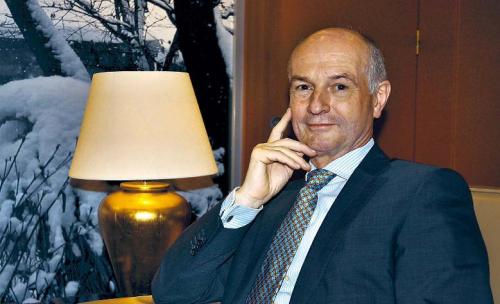Chamber advises SMEs to enter Korean market
Germany is benefiting from the Korea-EU FTA that went into effect in July as its exports to Korea are increasing, a top German chamber official said.
“We have already seen some positive effects but not as spectacular as some people might have thought,” said Korean-German Chamber of Commerce and Industry Secretary General Jurgen Wohler.
One reason for the not-so-spectacular expectations is the European debt crisis, which is hampering Korean exports to the 27-member block.
On the other side, European exports to Korea are up with German exports occupying the bulk of the trade.
“German exports are doing particular well because we are supplying primarily components to the Korean export industry,” he noted.
Besides the automotive and housewares sectors, Germany predominantly exports parts and components that are used in manufacturing and exported to third markets.
“The majority of our products are not going into the Korean domestic market, but going through Korea with a value added into third markets,” he said. “That’s why we are profiting because Korea’s exports have been so brisk.”
 |
Jurgen Wohler, Secretary General of the German Chamber of Commerce (Yoav Cerralbo/The Korea Herald) |
From July 1, the date the Korea-EU FTA came into effect, about 80 percent of Korean products shipped to the EU have been exempt from import tariffs while 60 percent of EU products exported to Korea enjoy the same benefits. In both cases, more tariffs will be reduced and eliminated in the years to come.
KORUS FTA good for competition
While European countries are enjoying the benefits implemented in both the EU and Korea, many countries are looking with an attentive eye toward the upcoming Korea-U.S. free trade pact set to take effect in the near future.
Yet, Wohler welcomes the competition that the KORUS FTA will bring.
“There is a general attitude, at least from the German side, to have more free trade in the world,” he said. “We are an ardent supporter of the WTO, so we welcome this step as well.”
Trade between Korea and Germany has increased 22 percent in the first nine months of the year from the previous year.
“We might reach a trade volume of about $29 billion,” Wohler said, a 93 percent difference favoring the Korean side compared to Germany’s trade relationship with India.
Korea has grown to become Germany’s fourth most important market and trading partner outside of Europe after China, the United States and slightly below Japan.
In total, German trade, which amounts to 40 percent of the total EU exports to Korea, accounts for more than the combined exports of Britain, France, Italy and Spain.
Korea as investment destination
Yet Wohler noted that Korea has a major disadvantage in Germany.
“It’s not as well known as it should be,” he said. “Also, due to its geographic location between China and Japan, it is somehow neglected.”
But things are changing, he explained, due to the Fukushima nuclear catastrophe in Japan and tougher procedures and taxes for exporting products out of China.
“Korea, with its very good infrastructure, its good location in the center of Northeast Asia and a good and stable political system is a good place to invest in,” he said.
Because of these advantages, Wohler has noticed an increase of small- and medium-size German companies setting up operations in Korea.
“Access in Korea is much easier than in China or Japan because of the good support by the government and local agencies. Prices are lower than Japan, so we are quite happy with the environment,” he said. The nation has shown that it is becoming an easier country to do business in.
According to the World Bank’s Ease of Doing Business index, Korea jumped to the 8th spot from 15 the year before, indicating the government’s work to simplify regulations for businesses and stronger protection of property rights are appealing to companies looking towards this part of the world.
“I don’t see Korea being particularly difficult to set up an investment,” he said. “The difference of making an investment in Eastern Europe versus Korea is negligible.”
The challenges new firms experience stem from intercultural problems.
“The attitude of Germans who want to have everything fixed and reliable is different from the Korean model where it’s a relationship and bargaining dominated approach,” he explained.
His recommendations are to talk to as many people as possible, build strong relationships and highlight the German company’s place in the world stage, something they tend to downplay, he said.
By Yoav Cerralbo
(
yoav@heraldcorp.com)








